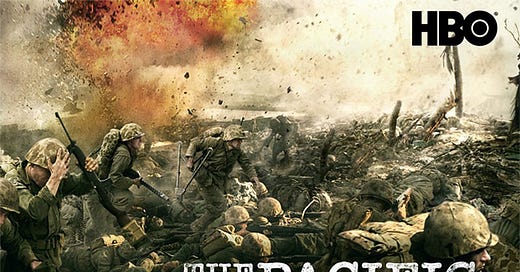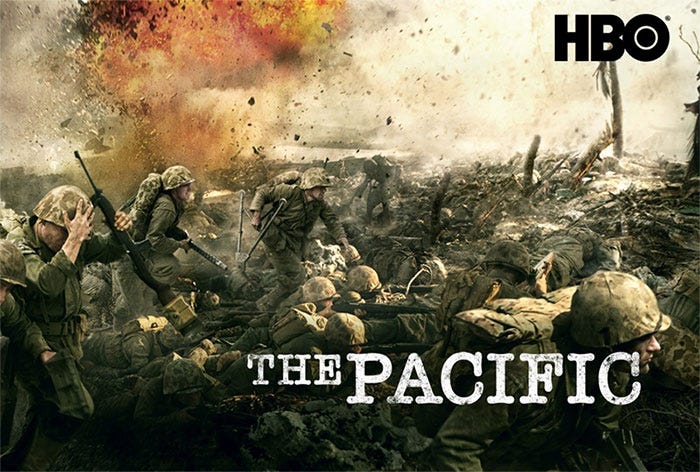The Pacific: A great mini-series to watch this Memorial Day
This 10-part mini-series about the Marines who fought in the Pacific is a must-see.
About ten years after producing Band of Brothers for HBO, Tom Hanks produced the mini-series The Pacific.
And though it didn’t get as much attention as Band of Brothers, The Pacific is definitely worth watching. In fact, if you can find it to rent (or just buy it!), The Pacific might be a good mini-series to watch this Memorial Day weekend.
I don't know about you, but every Memorial Day, I take the time to watch something that features our brave soldiers. This weekend, I’m renting They Shall Not Grow Old – Peter Jackson’s documentary film about World War One.
And, if it weren’t for the fact that I just watched The Pacific for the third time last weekend, I’d definitely watch that too. Heck, maybe I’ll watch it anyway. Why not? In fact, if I time it right, I could do a marathon and watch both Band of Brothers and The Pacific.
Band of Brothers follows the 101st Airborne’s Easy Company from their drop into Normandy the night before D-Day to their arrival in liberated Austria after Germany surrendered.
The Pacific follows the US Marines who fought the battles against Japan in, well, the Pacific theater -- Guadalcanal, the Solomon Islands, Iwo Jima, and Okinawa.
And, like Band of Brothers, The Pacific is based on the real lives of men who served. The three central characters of The Pacific are:
Robert Leckie (played by James Badge Dale) – a reporter for a New Jersey newspaper who enlisted in the Marines after Pearl Harbor. Leckie went on to write a memoir “Helmet for My Pillow” about his time in the Pacific during World War Two.
Eugene Sledge (played by Joseph Mazzello) – a young man from Mobile, Alabama who fought in the brutal Battle of Peleliu as well as the Battle of Okinawa. Sledge’s memoir “With the Old Breed: At Peleliu and Okinawa,” along with Leckie’s memoir formed the basis for this mini-series.
Finally, The Pacific includes the Medal of Honor winner and hero of Guadalcanal, Marine Sgt. John Basilone (played by Jon Seda). After winning the Medal of Honor Basilone was sent home to drum up War Bonds. But after a while, he didn't want to be a monkey dancing for War Bonds while his fellow Marines were fighting and dying in the Pacific. So Basilone went to Camp Pendleton to train Marine recruits. And when his recruits were set to ship off to the Pacific, Basilone reenlisted and joined them. John Basilone lost his life in the Battle of Iwo Jima and was posthumously awarded the Navy Cross for valor.
The Pacific is not always easy viewing to be sure. The Marines faced the harshest and most brutal conditions of the Second World War. Not that Europe or North Africa was a cakewalk. But at least the guys in Europe could go to Paris on leave. The episodes about Peleliu and Okinawa are especially gripping and horrifying.
The battle scenes are exceptionally well done – most notably the taking of the airfield on Peleliu island.
Unlike Band of Brothers, The Pacific doesn’t include the real-life men talking about their time during the war. But, by the time this mini-series was made in 2010, Leckie, Sledge, and of course, Basilone were no longer with us.
Where Band of Brothers ends before we see the men return home, The Pacific gives us a look at their return to civilian life.
All in all, this 10-part mini-series is well worth watching. It’s available to watch via Amazon Prime. It’s also available for purchase at iTunes and Amazon. There might be other places you can rent it online, but I don’t know about all the online streaming services so don’t ask me.
Back when I wrote “When Ordinary Men did Extraordinary Things” about Band of Brothers, I said, “It’s tragic that we are losing the Greatest Generation to the passing of time.”
It is up to us to remember them and to honor them.
These men who fought in the Second World War weren't supermen. They were laborers, students, farmers, shopkeepers – ordinary men. And yet what they did both in Europe and the Pacific during World War Two was nothing short of extraordinary.
So many young men who served in World War Two never returned home. They are buried throughout Europe and the Pacific -- in the sands of Iwo Jima, the mountains of Peleliu, the woods of Bastogne, the deserts of North Africa, and the beaches of Normandy.
At the end of Band of Brothers, Richard Winters shares a story his friend told him. His grandson asked him, “Grandpa, were you a hero in the war?” And he said, “No. But I served in the company of heroes.”
Memorial Day is not a memorial of granite or marble. It is a memorial made of flesh and blood – a living memorial. We as Americans are that living memorial to the men and women who fought and died for us.
The final stanza of the poem “In Flanders Fields” by John McCrae perfectly describes what is at the heart of this living memorial:
To you from failing hands we throw
The torch; be yours to hold it high.
If ye break faith with us who die
We shall not sleep, though poppies grow
In Flanders fields.
And this Memorial Day weekend, let us remember these men and women who sacrificed their lives to keep the torch of liberty burning. And now that torch is ours to hold high.
Let us not break faith with those who died.
Let us remember and honor them.
Because though they may not have seen themselves as heroes, to the grateful nation for which they died, they most certainly are.





